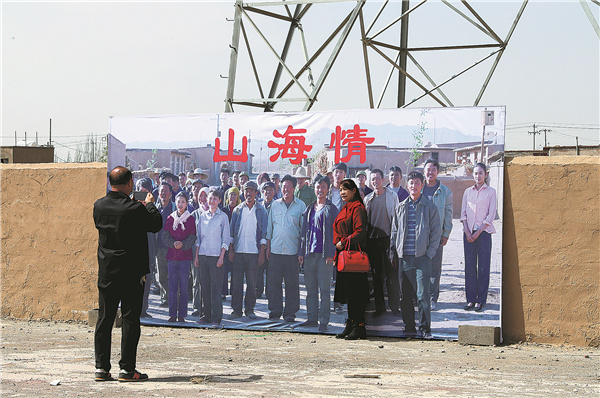

Rough days continued through their first New Year's Eve after relocation. With no electricity in the new village, Xie's family of seven lit candles to eat noodles in their adobe-style house. "After putting our children to sleep, my wife and I sat in the wilderness and counted the trains passing nearby. My mind, however, was back in the daytime, when the kids were crying for sweets, but I had no money at all. I was more than sad."
The next day, Xie and his fellow villagers went out to deal with the land.
When it was spring, they planted corn and, luckily, abundant irrigation from the Yellow River gave them a bumper harvest that year.
The good news attracted more people to move out of the mountains. Now, Minning village has developed into Minning town, home to 66,000 residents. Xie's house has a television, a refrigerator and a flushing toilet, and has been decorated with traditional Chinese paintings and calligraphy works. "Twenty-four years after moving here, I still feel like it's a dream."
As Xie and others were fighting against extreme weather to survive, Lin Zhanxi, a professor at Fujian Agriculture and Forestry University and the inspiration for Professor Ling Yinong in "Minning Town", led a team that traveled more than 2,000 km from humid Fujian to an abandoned cave in Xihaigu's Pengyang county. Carrying with them six boxes of fungus, they planned to figure out how to grow mushrooms in arid areas and begin a rich industry in Ningxia.
"Many relocated residents were concerned with bread-and-butter issues as there was no industry in the newly built village," says 78-year-old Lin. "Therefore we needed to develop an industry that could bring fortune quickly to reassure them as they settled down." Lin decided to plant Agaricus bisporus, a widely cultivated mushroom species with a short planting cycle and significant benefits.
After successful trials planting in Pengyang, Lin and his team visited Minning in 1998 and designed a semi-cellar mushroom house for the Gobi Desert, which could ensure suitable temperatures and humidity. As the locals had never planted the mushroom, Lin and other team members took the time to teach them, with each team member responsible for 30 to 50 households.
"Under the guidance of experts, I earned more than 7,000 yuan ($1,082) in the first year," says villager Liu Changfu. "I had never gotten so much money at once. I was very happy."
The Xihaigu people began to put down roots into the Gobi Desert. From grape planting and photovoltaic agriculture to cattle breeding, Minning town gradually welcomed more diversified industries with the deepening of cooperation between Fujian and Ningxia.
The town's annual per capita disposable income has increased from 500 yuan when relocation began to 14,900 yuan last year, when more than 7,000 impoverished households bid farewell to absolute poverty.
In 2014, Bai Xiyan's family was relocated to Minning town's Yuanlong village. There, unlike in the original Minning, houses, schools and hospitals had been built in advance. Bai's life changed there in 2019 when she and more than 50 rural women began to work in a new e-commerce poverty alleviation workshop.
In just one year, she became a manager and joined a livestreaming team to promote Ningxia's special agricultural products to audiences across the country, earning more than 3,000 yuan a month.
"The job not only offers me a stable income, it also brings confidence and dignity. More importantly, my 9-year-old daughter can live a different life," she says.
After moving out of the mountains, the children of Xihaigu gained access to better education. Scenes of students from different grades crowded into one classroom, which can be seen in the TV series, have in reality been a thing of the past.